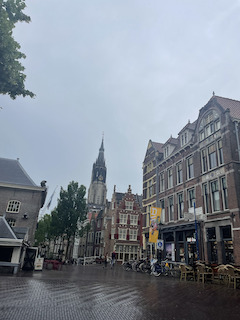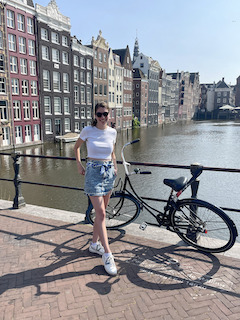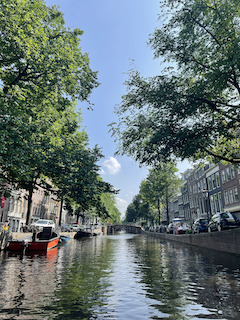Climate Assembly Research & Delft Trip
For work, my boss had Anna and I join him at a presentation by the International Development Law Organization (IDLO) about an effort to put forth essentially a climate change complaint before the International Court of Justice. I got to hear about the legal support that the organization had, referencing concepts like the United Nations’ rights of children. The effort was initially started by students living in the Pacific islands and had now made it from a grassroots campaign to The Hague. The final presentation was the most striking: a young woman shared her personal experiences with natural disasters in Australia and brought a strong sense of the human element to the need for the advancement of climate policy worldwide. The ambassadors of Bangladesh and Australia were also present and acknowledged by the presenters.
Back at the office, I continued finding background research on Georgia that was supplemented by election data. I studied which parties were in power before and after the transition from semi-presidentialism to parliamentarianism.
For the last few days with my parents in town, we went to dinner together for their anniversary in Delft. Delft is mostly a university town, and it was lovely despite the cloudy weather. The clock tower there was a sight to see and had the Netherlands-famous crooked tilt like some of the buildings do in Amsterdam. At IDEA, one of my coworkers, Sharon, returned from a trip and joined me in the office room where I work in. She had come back from “El Camino de Santiago” which is a pilgrimage I had learned about in high school and always wanted to learn more about. Since I had finished with my research on semi-presidential to parliamentary systems, next I began working on updating IDEA’s data on “climate assemblies.”
At IDEA, one of my coworkers, Sharon, returned from a trip and joined me in the office room where I work in. She had come back from “El Camino de Santiago” which is a pilgrimage I had learned about in high school and always wanted to learn more about. Since I had finished with my research on semi-presidential to parliamentary systems, next I began working on updating IDEA’s data on “climate assemblies.”
Climate assemblies are “citizen assemblies” where a group of about a hundred people is gathered as a representation of the population (taking demographics into account) and are asked to discuss a policy issue in an almost jury-like style. Citizen assemblies had a lot of success in Ireland in deciding on abortion policies and they are a favorite of political scientists right now. Their decisions are non-binding but help to inform the public while informing the government of public opinion on contentious topics. Climate assemblies focus on climate change and vary in their subtopics. I researched the climate assemblies in Austria, Spain, Poland, and Ireland. I learned how to use different document translator applications and found it especially interesting how Ireland had a climate assembly just on protecting biodiversity. Ireland also had a parallel “kids assembly” for the same topic that brought the younger generation into an important role.
For my parents’ last night in town, we went to a restaurant in The Hague for dinner called “Medi” which had a Mediterranean style of dinner that everyone shares small portions. The food was amazing and we ended the night with gelato by the Binnenhof.
The next night, Anna and I got to see The Hague lit up at night. Then, the following night after work I went to the beach again to enjoy the sunset. The public transportation is convenient right from near my apartment—although sometimes coming back from the beach gets very crowded.
On Sunday, I got to visit Amsterdam again. I went around De Dam where the palace is, walked in Vondelpark, and saw some crowded stroopwafel shops.
 The architecture and canals are so beautiful, and now I’m accustomed to watching for bikes when I’m crossing the bike lanes and streets.
The architecture and canals are so beautiful, and now I’m accustomed to watching for bikes when I’m crossing the bike lanes and streets.
